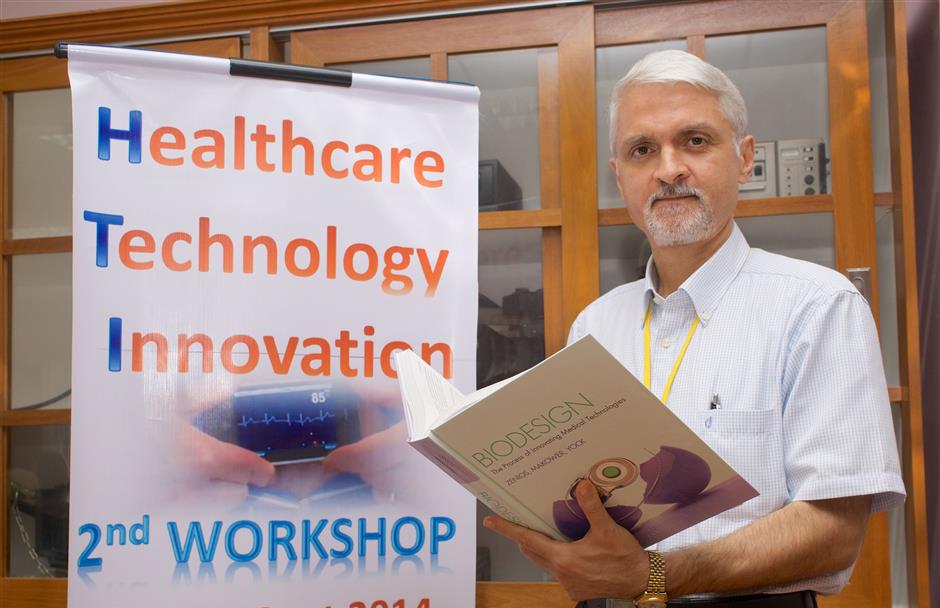Research and development (R&D) of medical devices at Universiti Kebangsaan Malaysia (UKM) is taking on a more needs driven approach lately, with the emphasis being on solving daily issues faced by local medical practitioners at the UKM Medical Centre (PPUKM).
“We teach them how to screen through the issues, perform a needs analysis and so they are able to pick a project and systematically follow certain guidelines to solve a particular problem,” says Professor Ismail Mohd Saiboon, senior consultant in emergency medicine and trauma orthopaedics and head of the department of emergency medicine at PPUKM.
The method being used to generate such innovative solutions is based on the Stanford Biodesign programme.
Under this technique, the focus of innovators would be on what is known as unmet clinical needs.
Researchers start off by identifying problems through observation of real life scenarios.
Then, desired outcomes or solutions that best solve those problems are determined through a combination of research and brainstorming sessions. The latter is enhanced through bringing together the rich experiences of a diverse group of experts in various fields.
“The idea... is to promote the knowledge of how to innovate and identify how to best choose projects so they have a higher chance of commercialisation,” says Professor Edmond Zahedi, associate professor at the department of electronics, electrical and system engineering at UKM.
Among the issues that Ismail hopes to see addressed is the need for a patient tracking system and a system which reports on the availability of hospital beds.
“Patients sometimes end up in the emergency ward for a long time as we search for beds. The current system doesn’t give you a real-time update of the status of beds,” he says.
As for tracking patients, he looks forward to having a device where it would warn relevant patients against leaving their beds while alerting hospital staff should the patient go against this advice.
The reason for a greater emphasis on studying local needs is so that medical innovations at UKM are better suited to the Malaysian context.
“A lot of times, we would buy equipment from overseas which is very costly. It is also often not appropriate for our culture,” explains Dr Hasherah Mohd Ibrahim, speech language pathologist and head of the speech sciences programme at UKM.
Diverse pool of experience
A recent event organised by UKM known as the Healthcare Technology Innovation (HTI) workshop illustrated this approach by calling together a multidisciplinary group comprising engineers, medical staff, IT experts as well as students to work on developing a few solutions to these existing problems.
“The HTI committee underwent a fact finding mission a few months before this workshop,” explains Professor Dr Ismail Mohd Saiboon, senior consultant in emergency medicine, trauma orthopaedics and head of the emergency medicine department at PPUKM.
“Basically we got all our staff to write down the problems they faced in their day-to-day job and we collected those information. So those are the problems being looked at here at the HTI workshop and hopefully this will help us to come up with innovative solutions that will yield results.”
“Most of the needs came from the health sciences,” shares Dr Gan Kok Beng, senior lecturer and research fellow from the engineering and built environment faculty at UKM. “We introduced them to rapid prototyping and mechanical prototyping techniques so they would know how to realise their ideas within a very short period.”
Through their participation in the HTI workshop, Dr Hasherah and team hopes to develop a portable device that can be used for therapy for children with cleft lip and palate.
“We would like to design a tool that parents can use to improve their child’s speech at home,” she says. “We are thinking systematically through how feasible it would be to produce this device by looking at market analysis and things we’ve learned through the workshop.”
Dr Hasherah adds that this would be really helpful for her profession as there are currently very few speech language therapists throughout the country, with their numbers totalling only around 250 nationwide. Hence, the development of such a device would certainly relieve the challenges faced by therapists in catering to the needs of all their patients.
“Children with cleft palate usually have problems producing speech clearly and will sound very hypernasal. The device we’re trying to develop will measure the clarity of their speech and give them real-time feedback on whether they are speaking correctly or not,” she says.
Besides this, another team who participated in the HTI workshop intends to design virtual reality games that can be used for physiological rehabilitation.
“There are a lot of challenges in rehabilitation and I think one of the solutions is technology because it saves manpower, cost, time and we’ve enough evidence to show that virtual reality is beneficial for our patients,” says Dr Devinder Kaur, head of the physiotherapy programme, school of rehabilitation sciences at UKM.
“It’s more motivating for patients when they can be immersed in a virtual reality environment and do things on their own whilst getting feedback on their actions. We hope to see at least one to two tasks applied into virtual reality so we can use it for rehabilitation purposes.”
She adds that virtual reality is a good place for patients, especially those with disabilities, to learn new skills or movements as they will remain safe throughout the exercise. What they have learned through virtual reality can then later be transferred to real life.
UKM: Solving local medical issues through needs-driven R&D
- TECH
-
Tuesday, 14 Oct 2014



